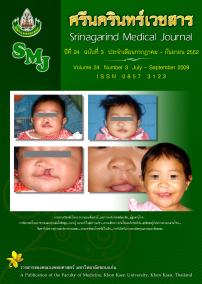ThaiScience
ThaiScience
SRINAGARIND MEDICAL JOURNAL
Volume 35, No. 02, Month MARCH, Year 2020, Pages 224 - 229
Deceased donor kidney transplantation in pediatric recipients a decade results in northeast thailand
Sunee Panombualert, Suwannee Wisanuyotin, Apichat Jiravuttipong
Abstract Download PDF
Background and objective: Kidney transplantation (KT) is the best modality treatment in children with end-stage renal disease. Our center has performed KT mostly from deceased donors due to short waiting time. The induction therapy by interleukin 2 receptor antagonist (IL2-RA) was limited use due to financial issue. Therefore, this study aimed to report our experience in pediatric deceased donor KT with restricted use of induction therapy. Methods: This retrospective descriptive study, review the results of KT over 10 years. Medical records of all pediatric KT recipients who were transplanted from 2003 to 2014 were reviewed. All patients received the same maintenance immunosuppressive drugs except the induction therapy by IL2-RA. We also reviewed the results of KT between two groups in a different period. Results: Forty-eight pediatric KT recipients were included in this study. The mean age of the recipients was 12.8 years and the mean age of the deceased donor was 30.3 years. All recipients were nonsensitized patients and compatible crossmatch. Fourteen patients (29%) received induction therapy with IL2-RA and methylprednisolone, the rest received only methylprednisolone (non-induction group). The rate of rejection and infection between the induction and non-induction groups did not differ significantly. The graft survival rates at 1, 3, and 5 years after KT were 93.7%, 83.9%, and 74.8%, respectively. The graft survival rates between induction and non-induction groups were not significantly different. The mortality rate of this study was 16.7%. Conclusion: The standard-risk pediatric deceased donor kidney transplantation in limited resources for induction therapy had satisfying results. However, the future study requires a greater data to support this outcome
Keywords
Kidney transplantation, Pediatrics, Deceased donorSRINAGARIND MEDICAL JOURNAL
Published by : Faculty of Medicine, Khon Kaen University
Contributions welcome at : http://www.smj.ejnal.com/e-journal/journal/index.php
